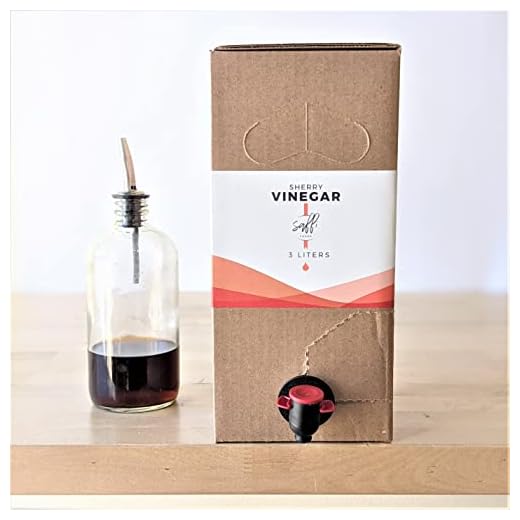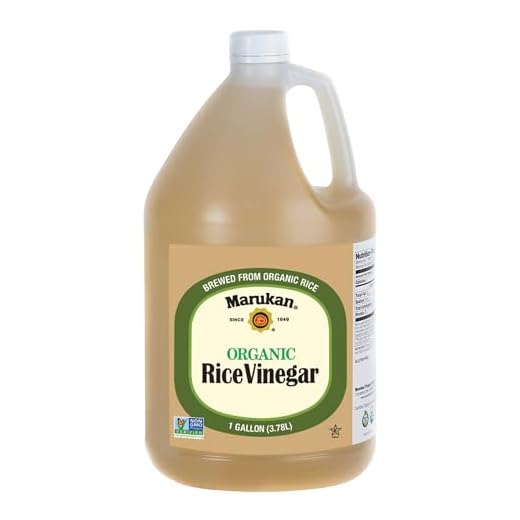

Apple cider vinegar serves as an excellent substitute, offering a similar acidity and fruity undertone. Its versatility allows for seamless incorporation into dressings, marinades, and sauces, enhancing flavors without overpowering them.
If you’re aiming for a milder option, rice vinegar is a fantastic choice. Its delicate sweetness pairs well with a variety of dishes, making it ideal for Asian-inspired recipes or light salads. Keep in mind that it has a lower acidity, so adjustments in quantity may be needed to achieve the desired tang.
Lemon juice can also elevate dishes when vinegar is required. The bright citrus notes complement many ingredients and contribute a refreshing zing. Use it where you’d typically reach for vinegar, especially in dressings or seafood dishes.
For those seeking a different flavor profile, sherry vinegar provides a complex richness. This option works beautifully in Mediterranean recipes, adding depth to sauces and braises. Its unique aroma can transform a dish, making it stand out.
Lastly, a mixture of white vinegar and water can mimic the sharpness of wine vinegar. This simple blend allows for a quick fix when other options aren’t available. Adjust the ratio to fit your taste preferences and the recipe requirements.
Alternatives to White Wine Vinegar
Cider vinegar serves as a fantastic substitute, offering a similar acidity with a mild apple flavor. Use it in salad dressings or marinades for a fruity twist.
Rice vinegar is another excellent option, especially for Asian cuisine. Its sweetness and gentle acidity can enhance dishes without overpowering them.
Lemon Juice
Lemon juice provides a bright, tangy flavor that can mimic the acidity of white wine vinegar. Ideal for dressings and sauces, it brings freshness to any dish.
Champagne Vinegar
Champagne vinegar boasts a light, delicate flavor that works well in gourmet recipes. It can elevate salads and seafood dishes without overwhelming other ingredients.
Apple Cider Vinegar as a Substitute
Apple cider vinegar serves as an excellent alternative for recipes requiring a different type of acidity. Its fruity undertones and mild flavor profile complement a variety of dishes, making it a versatile choice.
In dressings, a 1:1 ratio works well. The sweetness of apple cider vinegar enhances salads and marinades, providing depth without overpowering other ingredients.
For cooking, such as in sauces or braises, this vinegar can replace its counterpart effectively. Its acidity helps tenderize meats while adding a subtle apple flavor that enriches the dish.
When baking, substituting apple cider vinegar can also yield positive results. Combining it with baking soda creates a leavening effect, perfect for cakes or muffins.
In beverages, a splash of apple cider vinegar can refresh cocktails or mocktails, giving them a unique twist. Its distinctive taste balances well with various mixers.
Always consider the specific flavor profile of your dish before making the switch, as the apple notes may alter the final taste. Adjustments may be necessary, especially in delicate recipes.
Rice Vinegar: A Milder Alternative
For those seeking a gentle substitute, rice vinegar proves to be an excellent option. Its mild flavor profile complements numerous dishes without overpowering them.
Here are key points about rice vinegar:
- Originates from fermented rice, primarily used in Asian cuisine.
- Offers a subtly sweet and less acidic taste compared to other vinegars.
- Ideal for salad dressings, marinades, and dipping sauces.
When substituting, consider the following:
- Use a 1:1 ratio for direct replacements, ensuring flavor balance.
- For dishes requiring cooking, rice vinegar maintains its character, enhancing the overall dish.
- Experiment with seasoned rice vinegar for an added depth of flavor in dressings and sauces.
Incorporating rice vinegar can elevate your culinary creations while offering a softer touch to the palate.
Lemon Juice for Brightness and Acidity
Lemon juice serves as an excellent alternative, offering a tartness that enhances dishes. Its acidity mimics that of vinegar, making it suitable for dressings, marinades, and sauces.
Substitution Ratios
When substituting, a general guideline is to use an equal amount of lemon juice in place of vinegar. For intense acidity, a 1:1 ratio works well:
- 1 tablespoon of lemon juice for every tablespoon of vinegar.
Flavor Profile Enhancement
This citrus option not only adds acidity but also contributes brightness and freshness to meals. Pair it with olive oil for salad dressings or use it in seafood dishes to elevate flavors. It complements herbs beautifully, enhancing the overall taste experience.
For those interested in maintaining equipment, this resource might be useful: how do you change lidl parkside pressure washer nozzle.
Champagne Vinegar: A Gourmet Choice
Opting for champagne vinegar elevates dishes with its exquisite flavor profile. This variant, derived from the fermentation of champagne or sparkling wine, adds a nuanced sweetness and a delicate acidity that can enhance salads, marinades, and sauces.
In culinary applications, champagne vinegar’s light and fruity notes make it an excellent companion for vinaigrettes, especially when paired with ingredients like fresh herbs or citrus. Its subtlety allows it to enhance dishes without overpowering other flavors.
For those looking to substitute, this vinegar works harmoniously in recipes calling for a more traditional option. Just be mindful of its slightly sweeter character; adjustments in other sweet or acidic components may be necessary to achieve a balanced dish.
Using champagne vinegar in reduction sauces can impart a refined touch, making it a favored choice among gourmet chefs. Its versatility extends to finishing dishes, where a splash can brighten the overall flavor profile, adding depth to seafood, poultry, or roasted vegetables.
Experimenting with champagne vinegar can lead to delightful culinary discoveries, transforming everyday recipes into sophisticated creations. Its unique attributes make it a worthy addition to any kitchen, especially for those who appreciate the finer details in cooking.
Homemade White Wine Vinegar Replacement
Creating a substitute for that specific acidity at home is straightforward. Combine equal parts of apple cider vinegar and water for a tangy option, or blend red wine vinegar with a splash of lemon juice to brighten the flavor profile.
For an alternative with a fruity twist, consider mixing distilled vinegar with a hint of apple juice. This mixture retains the necessary acidity while adding a subtle sweetness, making it versatile for various dishes.
If you prefer a more robust flavor, try using a combination of sherry vinegar and a touch of honey. This will deliver a complex taste that can elevate dressings and marinades.
| Substitute | Ratio | Notes |
|---|---|---|
| Apple Cider Vinegar + Water | 1:1 | Tangy and versatile |
| Red Wine Vinegar + Lemon Juice | 2:1 | Brightens flavor |
| Distilled Vinegar + Apple Juice | 1:1 | Sweet and acidic |
| Sherry Vinegar + Honey | 2:1 + 1 tsp | Complex flavor profile |
Experiment with these combinations to find the perfect balance for your culinary creations. Adjust the ratios to suit your palate and the specific dish you’re preparing.
FAQ:
What are some common substitutes for white wine vinegar?
Some popular alternatives for white wine vinegar include apple cider vinegar, champagne vinegar, and rice vinegar. Apple cider vinegar offers a slightly sweet and fruity flavor, making it a good choice for salad dressings and marinades. Champagne vinegar has a milder taste and can enhance the flavors of delicate dishes. Rice vinegar is another option, especially in Asian cuisine, and provides a subtle sweetness. Each of these substitutes can be used in similar quantities to white wine vinegar in recipes.
Can I use lemon juice instead of white wine vinegar?
Yes, lemon juice can be used as a substitute for white wine vinegar. It provides a tangy acidity that can brighten up dishes. However, lemon juice has a distinct citrus flavor, which may alter the taste profile of your recipe slightly. It’s best to start with a smaller amount and adjust to taste, keeping in mind that lemon juice is more acidic than white wine vinegar.
How does the flavor profile change when using a vinegar substitute?
The flavor profile can change significantly depending on the substitute used. For instance, apple cider vinegar adds a fruity sweetness, while champagne vinegar contributes a light, delicate taste. Rice vinegar is milder and slightly sweet, making it suitable for certain dishes. If you opt for lemon juice, the citrus notes can dominate, which may not be ideal for every recipe. It’s important to consider the overall flavor combination of your dish when selecting a substitute.
Are there any non-vinegar alternatives to white wine vinegar?
Yes, there are non-vinegar alternatives such as yogurt or sour cream, which can provide a creamy tanginess to dishes. These options work well in dressings or dips where you want to maintain a rich texture. Additionally, using a mixture of water with a small amount of mustard can mimic the acidity of white wine vinegar without adding a vinegar flavor. Experimenting with these alternatives can yield delicious results depending on the dish you are preparing.








